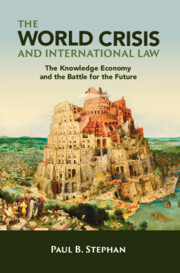
- Cited by 4
-
Cited byCrossref Citations
This Book has been cited by the following publications. This list is generated based on data provided by Crossref.
Carrapico, Helena and Farrand, Benjamin 2024. Cybersecurity Trends in the European Union: Regulatory Mercantilism and the Digitalisation of Geopolitics. JCMS: Journal of Common Market Studies, Vol. 62, Issue. S1, p. 147.
Farrand, Benjamin 2024. Regulating misleading political advertising on online platforms: an example of regulatory mercantilism in digital policy. Policy Studies, Vol. 45, Issue. 5, p. 730.
Hobson, Christopher 2024. A World Without Alternatives: R2P Meets TINA. Journal of Intervention and Statebuilding, Vol. 18, Issue. 2, p. 216.
Mavroidis, Petros C 2025. Industrial Policy, National Security, and the Perilous Plight of the WTO.
- Publisher:
- Cambridge University Press
- Online publication date:
- February 2023
- Print publication year:
- 2023
- Online ISBN:
- 9781009321020


